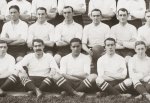r00fie1
Well-known member
https://www.theguardian.com/footbal...ack-football-pioneer-military-cross-tottenham


Extract:
Tull was one of the very first black professional footballers. Born in east London, he made his debut for Tottenham Hotspur in September 1909, before going on to play for Northampton Town. He was also the first black officer in the British army to lead white troops. A pioneer in football and the armed forces, he was tragically killed serving his country.......
Tull was among the first to sign up when war was declared in 1914. A member of the footballers’ battalion of the Middlesex Regiment, he fought in the Battle of the Somme in 1916 and was commissioned as a second lieutenant on 30 May, 1917 despite laws supposedly preventing him from doing so. Tull was cited for his “gallantry and coolness” during the Italian offensive of that year after safely leading 26 men on a night raiding party.
"..[he was denied the Military Cross until].....a top-secret memo sent by a General White – the head of recruitment in New York – to the War and Colonial Offices. That made it clear any “wooly [sic] headed niggers” were not wanted for the forthcoming spring offensive that eventually led to the allied victory later that year. “We now refuse to post coloured men to ‘white units,’” the memo stated. “These ‘niggers’ must therefore go to native units if accepted. Can we take them for W Indies or other bns [battalions]?”
Have things changed?
Walter was awarded the Military Cross following a campaign and he is commemorated at Northampton Town`s Sixfields ground.


Extract:
Tull was one of the very first black professional footballers. Born in east London, he made his debut for Tottenham Hotspur in September 1909, before going on to play for Northampton Town. He was also the first black officer in the British army to lead white troops. A pioneer in football and the armed forces, he was tragically killed serving his country.......
Tull was among the first to sign up when war was declared in 1914. A member of the footballers’ battalion of the Middlesex Regiment, he fought in the Battle of the Somme in 1916 and was commissioned as a second lieutenant on 30 May, 1917 despite laws supposedly preventing him from doing so. Tull was cited for his “gallantry and coolness” during the Italian offensive of that year after safely leading 26 men on a night raiding party.
"..[he was denied the Military Cross until].....a top-secret memo sent by a General White – the head of recruitment in New York – to the War and Colonial Offices. That made it clear any “wooly [sic] headed niggers” were not wanted for the forthcoming spring offensive that eventually led to the allied victory later that year. “We now refuse to post coloured men to ‘white units,’” the memo stated. “These ‘niggers’ must therefore go to native units if accepted. Can we take them for W Indies or other bns [battalions]?”
Have things changed?
Walter was awarded the Military Cross following a campaign and he is commemorated at Northampton Town`s Sixfields ground.


